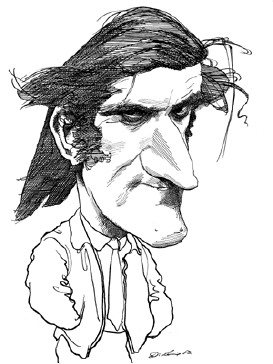 |
| Ted Hughes |
British Library apologises for linking Ted Hughes to slave trade
Treasure trove' of unseen Ted Hughes and Seamus Heaney writing found
The British Library has apologised to Carol Hughes, the widow of the former poet laureate Ted Hughes, after it linked him to the slave trade through a distant ancestor.
Hughes’s name had been included on a spreadsheet from the library detailing more than 300 figures with “evidence of connections to slavery, profits from slavery or from colonialism”. Hughes’s link was through Nicholas Ferrar, who was born in 1592 and whose family was, the library said, “deeply involved” with the London Virginia Company, which was set up to colonise North America.
 |
| Ted Hughes, in 1966. Photograph: Jane Bown |
Hughes was not directly descended from Ferrar, who died childless. Jonathan Bate, a biographer of the poet laureate, had hit out at his inclusion on the British Library’s list earlier this week. “Black Lives Matter, but this is going too far,” he wrote on Twitter. “Also, Nicholas Ferrar had no children: are we sure that the connection wasn’t family myth-making? Has anyone actually done a family tree?”
Now the library has publicly apologised for his inclusion, saying that the link should not have been made. “In particular we wish to apologise to Mrs Carol Hughes and to other family members and friends, owing to a reference included in the spreadsheet to a distant ancestor … which we withdraw unreservedly,” said the library. “While the document involved has been removed pending review, this reference will not be made again.”
The British Library said that its curators were working to identify collections “associated with wealth obtained from enslaved people or through colonial violence”, with the aim of sharing the information with researchers. But it admitted that “early presentation of these findings has caused confusion and concern, particularly in relation to connections drawn between named individuals and their ancestors”. “We regret profoundly the distress that this has caused and have removed the spreadsheet pending a review of this research,” it added.
 |
| Ted Hughes David Levine |
In a statement to the Times, Carol Hughes welcomed the “full apology” for “highly misleading comments … attempting to link the poet somehow with tenuous allegations of involvement in slavery by someone alleged to be a very distant ancestor who was born in the time of Shakespeare”. She also noted the library’s “acknowledgment of the distress caused by comments on the library’s website that should not have been made, and its assurance that these comments will not be repeated”.
Bate called the inclusion of Hughes “an error on so many levels - not only the tenuous, centuries-old connection, but also the fact that Nicholas Ferrar wrote a pamphlet attacking slavery even before the British slave trade had begun!”
“Over-zealousness of this kind undoes the important work of excavating the history of the institutions that have benefited from slavery - it plays into the hands of both the ‘cancel culture’ and the ‘anti-woke’ press,” he said.
According to the Encyclopaedia Britannica, Ferrar is chiefly known for bringing the poetry of George Herbert, which Herbert had asked him on his deathbed to destroy or publish, to public attention. He was also the founder of a Christian community at Little Gidding.


No comments:
Post a Comment